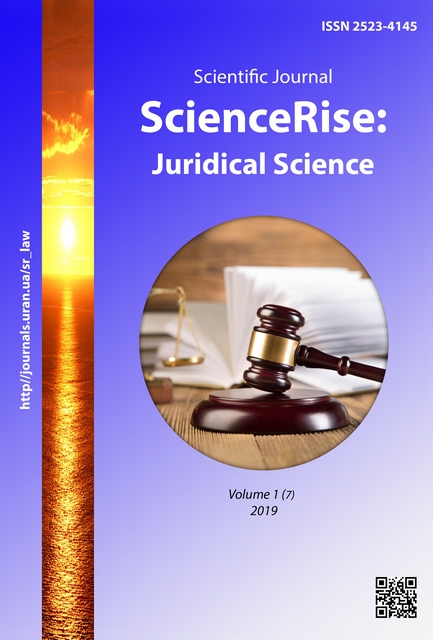Taking into account of psychological factors which apply to enforcement or to violation of the law in the legislative activities
DOI:
https://doi.org/10.15587/2523-4153.2019.160842Keywords:
psychology of law, Legislative activity, lawmaking, psychological theory of law, decision makingAbstract
One of the main criteria of the law quality is its ability to create a system of rules of conduct in real people’s life. For this purpose the rule must be adopted by them. This increases the relevance of a research of psycho-emotional processes which motivate people to choose behavior patterns within the normative-regulated rule.
After reviewing the issue in decision-making theory context, and in particular, in it’s emotional and rational research approaches, the following conclusion has been formulated: while choosing a behavior model people are guided by socially accepted standards and norms. They are inclined to regard such behavior as law-abiding. Despite the fact that the decision of a behavioral model choice is taken emotionally, emotion itself is rational rather than chaotic phenomenon.
Emotion, in essence, is a phenomenon that in general reflects conclusions from life experience events that a person accumulates in the process of socialization. Accordingly, when forming a model of behavior, a person is oriented not to the content of the law, but towards legal events, triggered by it. And particularly important are the actions of the primary executor of the act. These actions shape the first wave of legal events for the social group to be oriented to.
The psychological factors of a person's decision how to comply with a legal requirement may be predicted during legislative activity. This opens up the possibility of adjusting requirement details in order to increase the law quality up to the point, when it becomes a regulatory rule in their real life. In particular, the following factors may be taken into account: education, religious and social beliefs, major events, recently occurred in a social group, and the predominant reactions to these events
References
- Petrazhitskiy, L. I. (1909). Teoriya prava i gosudarstva v svyazi s teoriey nravstvennosti. Vol. 1. Saint Petersburg. Available at: http://www.allpravo.ru/library/doc108p/instrum4914/
- Stashhenyuk, V. V. (2009). Rukovoditelyu o prinyatii resheniy. Nauchno-metodicheskie problemy i novye tekhnologii obrazovaniya. Energobezopasnost' i energosberezhenie, 3 (27), 38–42.
- Yurkov, O. S. (2016). Teorii pryiniattia rishen. Mukachevo: MDU, 135.
- Jackson, J., Bradford, B., Hough, M., Myhill, A., Quinton, P., Tyler, T. R. (2012). Why do People Comply with the Law?: Legitimacy and the Influence of Legal Institutions. British Journal of Criminology, 52 (6), 1051–1071. doi: http://doi.org/10.1093/bjc/azs032
- Khodakivskyi, Ye. I., Bohoiavlenska, Yu. V., Hrabar, T. P. (2011). Psykholohiia upravlinnia. Kyiv: Tsentr uchbovoi literatury, 664.
- Systemy pidtrymky pryiniattia rishen: konspekt lektsii (2014). Kharkiv: Kharkivskyi politekhnichnyi instytut. Available at: https://studfiles.net/preview/6059894/
- Pavelkiv, R. V. (2009). Zahalna psykholohiia. Kyiv: Kondor, 576.
- Shynkaruk, V. I. (Ed.) (2002). Filosofskyi entsyklopedychnyi slovnyk: entsyklopedyia. Kyiv: Abrys, 742.
- Safronova, L. B. (2014). Vyznachennia poniattia "sotsialnyi dosvid": teoretychnyi aspekt. Teoretyko-metodychni problemy vykhovannia ditei ta uchnivskoi molodi, 18 (2), 213–221.
- Kyzymenko, L. D., Biedna, L. M. (2000). Slovnyk-dovidnyk sotsialnoho pratsivnyka" (dlia studentiv ta sotsialnykh pratsivnykiv). Mini-hlosarii. Lviv: DTs MOU, 67.
- Tanchyn, I. Z. (2008). Sotsiolohiia. Kyiv: Znannia, 351.
- Varii, M. Y. (2007). Zahalna psykholohiia. Kyiv: Tsentr uchbovoi literatury, 968.
- Huberskyi, L. V., Sulima, Ye. M., Kremen, V. H., Andrushchenko, V. P., Mykhalchenko, M. I. (2013). Filosofiia. Kharkiv: Folio, 509.
- Pro vnesennia zmin do deiakykh zakonodavchykh aktiv Ukrainy u zviazku z pryiniattiam Podatkovoho kodeksu Ukrainy (2018). Zakonu Ukrainy No. 2756-VI 07.03.2018. Available at: https://zakon.rada.gov.ua/laws/show/2756-17
- Pro tymchasovi osoblyvosti zdiisnennia zakhodiv derzhavnoho nahliadu (kontroliu) u sferi hospodarskoi diialnosti (2018). Zakonom Ukrainy No. 1728-VIII 01.01.2018. Available at: https://zakon.rada.gov.ua/laws/show/1728-19
- Pro vnesennia zmin do Zakonu Ukrainy "Pro status veteraniv viiny, harantii yikh sotsialnoho zakhystu" shchodo statusu osib, yaki zakhyshchaly nezalezhnist, suverenitet ta terytorialnu tsilisnist Ukrainy (2015). Zakon Ukrainy No. 291-VIII 07.04.2015. Available at: https://zakon.rada.gov.ua/laws/show/291-viii
- Skakun, O. F. (2011). Teoriia prava i derzhavy. Kyiv: Alerta; TsUP, 524.
- Kelzen, H. (2004). Chyste pravoznavstvo: z dodatkom: Problemy Spravedlyvosti. Kyiv: Yunivers, 496.
Downloads
Published
How to Cite
Issue
Section
License
Copyright (c) 2019 Kyrylo Serhieiev

This work is licensed under a Creative Commons Attribution 4.0 International License.
Our journal abides by the Creative Commons CC BY copyright rights and permissions for open access journals.
Authors, who are published in this journal, agree to the following conditions:
1. The authors reserve the right to authorship of the work and pass the first publication right of this work to the journal under the terms of a Creative Commons CC BY, which allows others to freely distribute the published research with the obligatory reference to the authors of the original work and the first publication of the work in this journal.
2. The authors have the right to conclude separate supplement agreements that relate to non-exclusive work distribution in the form in which it has been published by the journal (for example, to upload the work to the online storage of the journal or publish it as part of a monograph), provided that the reference to the first publication of the work in this journal is included.








